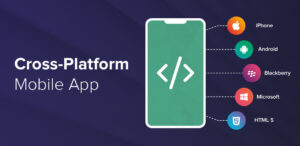Understanding Cross-Platform App Development
At its core, cross-platform app development refers to the practice of building mobile applications that can run seamlessly on multiple operating systems, such as iOS and Android, using a single codebase. Unlike traditional native app development, which requires separate codebases for each platform, cross-platform development streamlines the process by allowing developers to write code once and deploy it across various platforms.
The Rise of Cross-Platform Development Tools
In recent years, the popularity of cross-platform development tools has surged, driven by the demand for cost-effective and time-efficient app development solutions. Frameworks such as React Native, Flutter, Xamarin, and Ionic have emerged as frontrunners in the cross-platform development space, offering developers the flexibility to create high-quality apps with native-like performance and user experiences.
Benefits of Cross-Platform App Development
The advantages of cross-platform app development are manifold, making it an attractive choice for businesses looking to maximize their reach and efficiency:
- Cost-effectiveness: By utilizing a single codebase for multiple platforms, businesses can significantly reduce development costs compared to maintaining separate codebases for each platform.
- Faster Time-to-Market: Cross-platform development streamlines the development process, allowing businesses to launch their apps faster and gain a competitive edge in the market.
- Consistent User Experience: With cross-platform development, businesses can ensure a consistent user experience across different devices and platforms, enhancing brand loyalty and user satisfaction.
- Ease of Maintenance: Managing a single codebase simplifies maintenance and updates, enabling businesses to roll out new features and fixes more efficiently.
- Wider Reach: By targeting multiple platforms with a single app, businesses can reach a broader audience and maximize their app’s potential for success.

Challenges and Considerations
While cross-platform app development offers numerous benefits, it also comes with its own set of challenges and considerations:
- Performance Optimization: Achieving native-like performance can be challenging, particularly for complex or graphics-intensive apps. Developers must carefully optimize their code to ensure optimal performance across all platforms.
- Platform Limitations: Not all platform-specific features may be readily available in cross-platform development frameworks. Developers may need to find workarounds or alternatives to implement certain functionalities.
- Tooling and Ecosystem: Each cross-platform development framework comes with its own set of tools, libraries, and ecosystems. Businesses must choose the right framework that aligns with their project requirements and development team’s skillset.
- User Interface Consistency: Maintaining a consistent user interface design across different platforms can be challenging, as each platform may have its own design guidelines and conventions.
Embracing the Future of App Development
As the mobile landscape continues to evolve, cross-platform app development is poised to play an increasingly vital role in helping businesses reach their audience and achieve their goals. By leveraging the power of cross-platform development tools and frameworks, businesses can unlock new opportunities for innovation, growth, and success in the digital age. Whether you’re a startup looking to launch your first app or an established enterprise seeking to expand your mobile presence, cross-platform app development offers a pathway to seamless digital experiences and unparalleled business success.
Connect with Us Today and Let’s Build Your Next Cross-Platform App Together!



